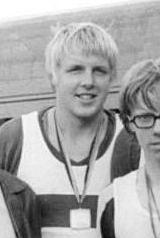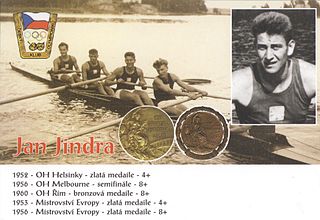
Moto Guzzi is an Italian motorcycle manufacturer and the oldest European manufacturer in continuous motorcycle production.

Mervyn Thomas Wood, was an Australian rower and police officer. He was an eight-time Australian national sculling champion, four-time Olympian and three-time Olympic medalist. He later rose to become the Commissioner of the New South Wales Police Force.

Italy competed at the 1948 Summer Olympics in London, England. 215 competitors, 195 men and 20 women, took part in 89 events in 16 sports.

Italy competed at the 1952 Summer Olympics in Helsinki, Finland. 231 competitors, 208 men and 23 women, took part in 114 events in 19 sports.

Italy competed at the 1956 Summer Olympics in Melbourne, Australia and Stockholm, Sweden. 129 competitors, 114 men and 15 women, took part in 76 events in 13 sports. As the country hosted the next Olympics in Rome, the flag of Italy was hoisted at the closing ceremony.
Duilio Agostini was an Italian Grand Prix motorcycle road racer. He had his best year in 1955 when he won the 350cc French Grand Prix and finished the season in seventh place in the 350cc world championship. He is not related to Grand Prix motorcycle racing legend Giacomo Agostini.
Ivo Stefanoni is an Italian rowing cox and Olympic champion.
Elio Morille was an Italian rower who competed in the 1948 Summer Olympics and in the 1952 Summer Olympics.
Giovanni Invernizzi was an Italian rower who competed in the 1948 Summer Olympics and in the 1952 Summer Olympics.
Francesco Faggi was an Italian rower who competed in the 1948 Summer Olympics and in the 1952 Summer Olympics.
Gaston Antoine Mercier was a French rower who competed in the 1952 Summer Olympics, in the 1956 Summer Olympics, and in the 1960 Summer Olympics.
Fulvio Balatti was an Italian rower who competed in the 1960 Summer Olympics and in the 1964 Summer Olympics.
Giovanni Zucchi was an Italian rower who competed in the 1956, 1960, and the 1964 Summer Olympics, winning bronze in 1960. He won five gold medals at European Rowing Championships.
Tullio Baraglia was an Italian rower who competed in the 1960 Summer Olympics and in the 1968 Summer Olympics.
Giancarlo Crosta was an Italian rower who competed in the 1960 Summer Olympics.
Pier Angelo Conti-Manzini was an Italian rower who competed in the 1968 Summer Olympics and in the 1972 Summer Olympics.

Siegfried Brietzke is a German rower. He competed for East Germany, first in coxless pairs, together with Wolfgang Mager, and then in coxless fours. In these events he won Olympic gold medals in 1972, 1976 and 1980, as well as four world championships in 1974–1979.

The men's coxed four competition at the 1956 Summer Olympics took place at Lake Wendouree, Ballarat, Australia. It was held from 23 to 27 November and was won by the team from Italy. There were 10 boats from 10 nations, with each nation limited to a single boat in the event. Italy had previously won this event in 1928, tying Switzerland for second-most wins among nations. Sweden (silver) and Finland (bronze) each won their first medal in the men's coxed four. Switzerland had its three-Games silver-medal streak broken, without a Swiss crew competing.

The men's coxed four competition at the 1952 Summer Olympics took place at Mei Bay, Helsinki, Finland. It was held from 20 to 23 August and was won by the team from Czechoslovakia. There were 17 boats from 17 nations, with each nation limited to a single boat in the event. The gold medal was Czechoslovakia's first medal in the men's coxed four. Switzerland earned its third consecutive silver medal, and sixth medal in seven Games dating back to 1920. The reigning champion United States took bronze.

The men's coxed pair competition at the 1952 Summer Olympics took place at Meilahti, Finland. It was held from 20 to 23 July. There were 15 boats from 15 nations, with each nation limited to a single boat in the event. The event was won by French team Raymond Salles, Gaston Mercier, and coxswain Bernard Malivoire; it was the nation's first victory in the event. Germany, which had won the event in 1936 but had been excluded from the 1948 Games after World War II, took silver. Sweden, the defending champions, had an all-new crew of Svend Ove Pedersen, Poul Svendsen, and cox Jørgen Frantzen; they took bronze.





